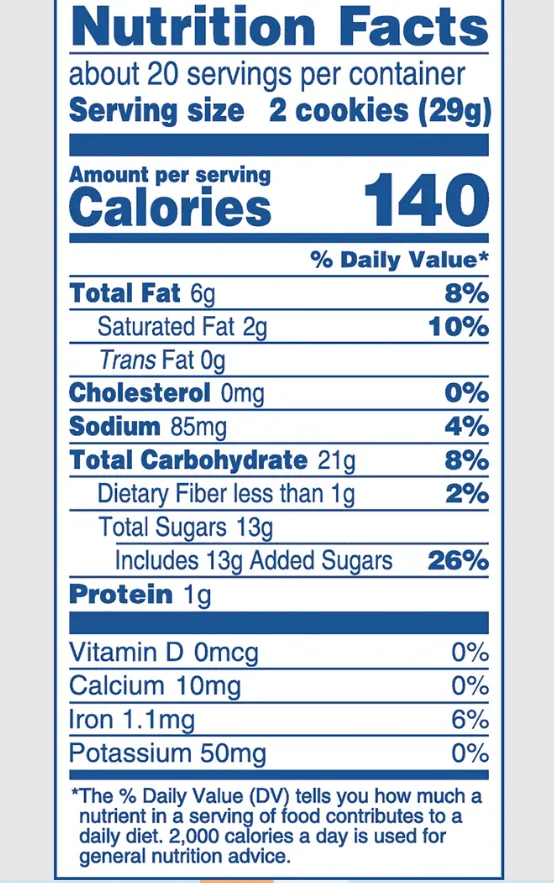Think twice before having too many Oreos

Oreo, America’s favorite cookie, was first introduced in the market in 1912 by Nabisco. Today, Oreo is available in quite a few flavors, and people are bound to like at least one of them.
That could be why over 4 million consumers had 8 or more Oreo packets (surveyed in 30 days of 2020).
What if every time you overconsume Oreo, you’re one step closer to the most frightening health issues of the decade? Would you still savor its taste and crave for more?
Here we’ll discuss why you should think twice before having too many Oreos. For that, we will dive into Oreo's nutrient composition.
Table of Content
Nutrient Composition
Note: This label is for 2 cookies. You'll find the nutrient composition for 5 and 10 cookies below.

Oreo Nutrient Composition
Here are the main nutrients you will get from having Oreos.
Calories
A calorie is a unit of energy consumed by the body. Since energy is essential for living, calories are generally a good thing.
But when a body doesn’t burn calories, it accumulates as fat. Specifically speaking, a person will gain a kg (2.2 pounds) when there are 7000 unburnt calories in the body.
So, it’s generally recommended that women have a maximum of 2000 calories and men have 2500 calories in a day.
How many calories do you get by having Oreos?
From the table, we know that 2 cookies give 140 calories. This means that:
10 cookies give 700 calories.
5 cookies give 350 calories.
29 cookies give 2030 calories.
36 cookies give 2520 calories.
So, having 10 cookies can supply you with energy usually obtained from lunch or dinner. Also, a woman can exceed the daily intake limit of calories if she has more than 29 Oreo cookies, and a man can do the same by having 36.
Oreo cookies supply high amounts of energy to the body. The excess calories could accumulate as fat and, over time, lead to obesity, heart diseases, high blood pressure, and other diseases.
Fat
Although all fats are known to be heart-damaging, only some are actually harmful.
Unsaturated fats have lower disease risks - they're the healthy fats the body needs, whereas trans fats are bad. Saturated fats, the third type, fall in between good and bad fat.
Irrespective of the type of fat, a person consuming 2000 calories a day shouldn’t have more than 78g of total fat (FDA). And saturated fats should not account for more than 10 percent of the 2000 calories (1g fat supplies 9 calories).
So, a person with a 2000-calorie diet should have only 23g of saturated fats.
From the label, you can see that 33.33 percent of the fats in Oreo are saturated. Therefore:
10 cookies give 30g of fat.
5 cookies give 15g of fat.
26 cookies give 78g of fat, of which 26g is saturated.
So, a person can exceed the daily fat limit by having just 26 cookies a day.
Not only does Oreo supply harmful saturated fats, but it does so in excess. The excess fats can accumulate in the arteries and body and cause heart disease and obesity.
Sugar
Of all the components in Oreo, you need to be most concerned about Sugar. Technically, sugars are carbohydrates. To the layman, sugar is a sweet-tasting, colorless, and water-soluble compound.
Oreo has added sugar - which is very different from healthy natural sugar. Since the body absorbs added sugar directly into the body, it immediately boosts the blood sugar levels, messing with the metabolic system.
Therefore, the AHA (American Heart Association) has recommended a daily intake limit for women (25g), children (24g), and men (36g).
On the other hand, natural sugars are obtained from fruits and other natural products. You can't digest this sugar easily. Therefore, they don't possess much threat, unlike added sugars.
How much added sugar does Oreo have?
Two Oreo cookies contain 13g of added sugar. This means that:
10 cookies give 65g.
5 cookies give 37.5g.
4 cookies give 26g.
6 cookies give 39g.
So, a woman or a child can exceed the daily sugar limit by having 4 Oreo cookies, and a man can do the same by having 6.
Oreo is extensively high in sugar. Regular consumption of Oreo can cause many health issues, including tooth decay, diabetes, high blood sugar, and more.
Oreo Addiction
In addition to having high sugar, fats, and calories, Oreo is addictive.
The mystery behind Oreo addiction lies in its sugar and fat amounts. The combination triggers the brain's pleasure center - the part drugs like cocaine act on.
A study conducted on rats showed that they were addicted to Oreos like they were to cocaine. This could be why people consume Oreo cookies without control.
The Verdict
Oreo cookies have high amounts of sugar, fat, and calories. Therefore, it can cause severe health conditions like diabetes, obesity, and heart disease.
However, you can avoid its harmful effects by having it in moderation. All you need to do is control the consumption of Oreo cookies to 2 or 3 per day.
In short, think twice before having too many Oreos.
Like this project
Posted Jul 8, 2024
I wrote this informative article for NewsBreak. You can check out the original article in my NewsBreak profile.
Likes
0
Views
1.2K





